Bombing in Israeli City Injures 56
A Palestinian suicide bomber blew himself up Sunday near the unguarded entrance to a crowded cafe in this seaside city, injuring more than 50 people. But police said the sight of an Israeli soldier emerging from the cafe apparently deterred the bomber from entering, averting a larger catastrophe.
The militant group Islamic Jihad claimed responsibility for the attack and called it a “gift to the heroic people of Iraq.” The blast -- the first suicide attack inside Israel since the start of the U.S.-led war in Iraq, and the first since a bus bombing in the northern city of Haifa killed 17 people 3 1/2 weeks ago -- shattered windows, overturned outdoor tables and sent shrapnel flying in all directions, witnesses said.
“It was a huge explosion,” said 32-year-old Zohar Bat Sharon, who was seated inside the cafe with her husband and 1-year-old son, Maayan. “Pieces of glass and flesh fell into my baby’s carriage -- my husband snatched up the baby, and I found myself in the hospital.”
The infant was unhurt; his mother was treated for shock. Hospital officials said 56 people suffered injuries ranging from minor cuts to serious wounds. A soldier who was one of about a dozen troops in the vicinity when the blast hit was reported to be in critical condition with abdominal injuries and a shrapnel wound to the neck.
Witnesses said that just before 1 p.m. the Cafe London, a popular hangout at the center of an open-air mall and promenade in the heart of Netanya, was so packed with customers enjoying a sunny Sunday that not a single table was free.
District Police Chief Avi Biran said an Israeli soldier in uniform emerged from the cafe, which had tables outdoors and indoors, just as the bomber approached the entrance.
“Maybe he panicked and so he blew himself up outside,” Biran said. “If he had blown himself up inside, it would have been worse.”
Indoors, the strength of the blast would have been magnified by the confined space, probably causing many more casualties, officials said. Israeli media quoted police sources as saying the bomb was a relatively small one, containing about 6 pounds of explosives but studded with nails and small pieces of metal.
David Baker, an aide to Israeli Prime Minister Ariel Sharon, called the bombing a “brutal reminder of the cruelty of Palestinian terrorism.” The Palestinian Authority, whose new prime minister, Mahmoud Abbas, is expected to form a government in coming weeks and will be under heavy pressure to halt such attacks, also condemned the bombing.
Islamic militant groups, though, are already seeking to capitalize on anger in the Arab world over the war in Iraq. Islamic Jihad leader Ramadan Abdullah Shallah, who is based in Damascus, Syria, told the Arabic-language satellite channel Al Jazeera that the bombing had been intended as a gesture of solidarity with Iraq as well as a blow on behalf of Palestinians.
Because they are such frequent targets of suicide attacks, most Israeli cafes have hired guards, some equipped with metal detectors, to check customers’ bags and parcels as they enter. But police said that, unusually, there was no guard posted outside the Cafe London.
There is no legal requirement to hire a security guard, although having one is a condition for obtaining certain types of commercial licenses, said national police spokesman Gil Kleiman.
Israel had been on high alert against potential attacks Sunday, a historically volatile day of protest by Palestinian citizens of Israel known as Land Day. It has been an annual observance since 1976, when six Palestinians were killed in a protest against Israeli confiscation of Arab land.
Land Day demonstrations were held in several predominantly Arab towns inside Israel, but the protests were generally peaceful.
Israel also has been on edge since the start of hostilities in Iraq, although fear of a missile attack by Iraqi President Saddam Hussein has diminished since the early days of the fighting. Even so, Israeli children are still going off to school each morning with cardboard parcels containing their gas masks dangling from their shoulders like lunchboxes, and antimissile batteries and air defenses remain on a high state of alert.
In recent weeks, Israeli officials have voiced worries about reprisal attacks against Israel in response to the U.S.-led military campaign.
Netanya, 20 miles north of Tel Aviv, lies in the narrowest part of Israel’s “waist,” where the West Bank skirts closest to the coastal plain. Islamic Jihad said the attacker who carried out Sunday’s bombing was from the Palestinian town of Tulkarm, which lies seven miles from Netanya, across the “green line” that separates Israel from the West Bank.
The city’s vulnerability to attack was underscored last May 19 when three people were killed and 76 wounded in a suicide bombing in the main market, even though there was a heavy Israeli troop presence at the time in the entire northern West Bank.
Netanya was also the scene, one year and four days ago, of what remains the single worst suicide bombing of the 2 1/2-year-old conflict with the Palestinians -- an attack on a Passover Seder in a ballroom at the Park Hotel.
Twenty-nine people were killed and more than 140 hurt in that blast, which reduced the ballroom to a ruin of shattered glassware, scorched white tablecloths and bloodied bodies. The victims included several elderly Holocaust survivors.
The ferocity of the attack, which came on the heels of a series of other suicide bombings, prompted Sharon to order a sweeping military takeover of the West Bank in order to hunt down Palestinian militants. Weeks of pitched urban battles followed in most of the West Bank’s population centers: Ramallah, Nablus, Bethlehem and Jenin.
In the intervening months, the Israelis have pulled back to the outskirts of most of those cities but continue to stage periodic raids aimed at arresting or killing wanted militants. Tight military curfews and travel restrictions continue to disrupt the lives of tens of thousands of Palestinians, preventing many from getting to work, attending school or seeing doctors.
For many in Netanya -- including nurses and doctors at Laniado Hospital, where many of those injured in Sunday’s attack were taken -- the timing of the bombing brought back traumatic memories of last year’s Passover attack.
“I have been so terrified as we approach Passover this year -- I didn’t know what was going to happen. And now this is happening,” said Ruth ben Chayim, who works in hospital admissions.
Last March 27, she recalled, she and her husband abandoned their own Passover Seder and rushed to the hospital as a flood of injured people arrived -- “a terrible, terrible sight.” On Sunday, townspeople gathered at the hospital to pass out tea and cookies, offering a gesture of comfort to families of the injured of the latest bombing.
Even though coffeehouses and cafes have been targeted again and again by bombers, they are an integral part of Israeli social life, a small daily pleasure that people refuse to give up despite the dangers.
Sunday’s bombing, though less deadly than many others, was another reminder of a threat that might seem to lift for weeks or even months but never goes away entirely.
“We live with terror. All day long, I’m looking over my shoulder,” said Sidney Bujo, a house painter who was at the scene in Netanya and pressed three fingers over the soldier’s neck wound until paramedics arrived. “At any moment, something like this can happen.”
*
Special correspondent Morris reported from Netanya and Times staff writer King from Jerusalem. Researcher Tami Zer in Netanya contributed to this report.
More to Read
Sign up for Essential California
The most important California stories and recommendations in your inbox every morning.
You may occasionally receive promotional content from the Los Angeles Times.






